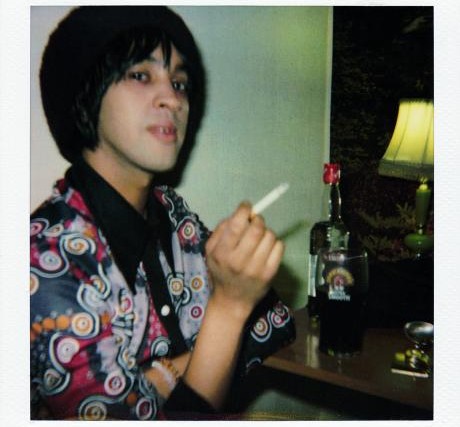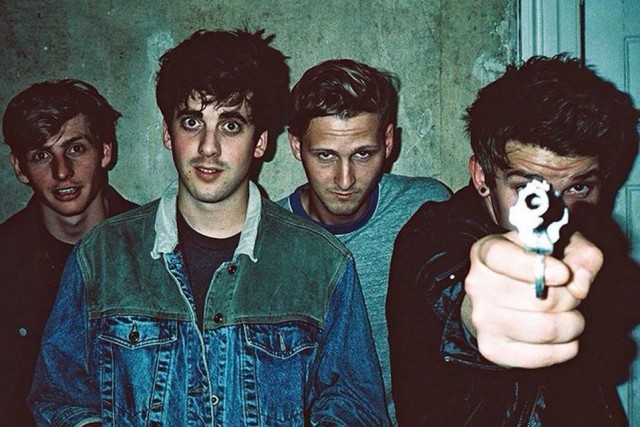Playlist: GIT Award Shortlist 2015
With some of the excellent shortlist already signed to Domino, XL and Heavenly Recordings, do we really need the Get Into This Award? Joshua Potts considers Merseyside’s music scene now…
As Sound City climbs a few more rungs up the festival ladder – spinning that controversial waterfront move into publicity gold for a more accessible, progressive Liverpool – another calendar staple comes slinking into our hemispheres. The GIT Award, set up in 2012 by Getintothis’ Peter Guy, is returning to the Kazimier for a one-night celebration of Merseyside’s best new musicians, and the event has lost none of the bluster and heraldry it presumes to validate through its pick n’ mix finalists, all earnest and varied enough to make calling a clear winner impossible.
There is a prize, of course: £1000, the fattish crown of a judging panel drawn from all corners of the UK (including The Quietus editor John Doran, Bella Union’s Simon Raymonde and Clash Magazine’s deputy editor Robin Murray), inaugurating the Next Big Thing before he or she has arguably fought their way out of the first box they’ll be packaged in. It appears the GIT Award is positioning itself as the city’s definitive map of musical topography, a weathervane spinning the winds of change into cash and press reviews, imparting a sense of concreteness before the rest of the career rigmarole rolls around, or rolls them under.
Consider this. In the past, we’ve had Loved Ones, Baltic Fleet and Forest Swords take the top spot, but only the last of these three has had any measure of national success. Liverpool’s music scene, while vibrant and full of surprises, tends to be trapped in its own camaraderie, content to chug out ill-defined ideas of progression for the tourist board. This doesn’t, of course, diminish how alive the city’s artistic benediction continues to be – pass the Shipping Forecast, Zanzibar, Kazimier or the Magnet on a weekend, and you can hear a wondrous electricity leaking through the doors, the shudder of dancing feet. We are lucky to live in a place that’s small enough to make connections and notorious enough to brag about them.
Although venues in choice locations are sometimes threatened with sky-high rent costs (MelloMello, you died too young…), new and previously neglected spaces keep emerging; The Invisible Wind Factory, for instance, is a prime example of finding that sweet spot between ace design, music and vision, with the talent to back it up. There are plenty of local playgrounds promising a gig that will change your life, screaming their love from poster-clad walls and the drape of a red curtain.
Despite Liverpool’s creative integrity, it’s tempting to be happy with this and nothing more, like a kid transfixed by the big bow on his present. If a band wants to escape the cycle of local gigs, they must be truly original, knowingly populist, or have a knack for meeting the right people. Since the Coral bowed out of the national stage around four years ago, jangle-rock has lost its predominance in the Mersey scene; a good thing, no doubt, as bands like Bird and Stealing Sheep have forged ahead on unpredictable approaches to guitar music, offsetting burgeoning popstars such as Dan Croll, Ed Black and Natalie McCool. Meanwhile, psychedelia’s mainstream revival has been mirrored in the sonic wizardry of Ninetails and Mind Mountain, while good ol’ acoustic loveliness refuses to be blown asunder, led by the graceful charge of Silent Cities to the top of the date-night heap.
Then again, today’s music industry is overburdened with choice. We have access to any song by any band ever, and the concept of a movement no longer threatens the mainstream like it once did – there’s just too many genres being thrown into one another, and far too few people buying music to warrant pulling the strings of mass publicity. There are a lot of artists fighting for two minutes of our time, which begs the question: why, in a period of democratisation levelling the playing field for bands across the entire world, do we need an excuse for more navel gazing, for an awards ceremony built on assumptions of critical substance in a small place, on a small scale, isolated from countless other regions enjoying the fruits of local labour?
It might just be the potential of making a living from music that saves the GIT Award from a mere masturbatory influence. The prize money is a bonus, but the real coup could be performing or speaking to a throng of Merseyside’s main players, being eyeballed for future bookings or collaborations. Any help getting an artist to that mid-tier level — in that afore-mentioned, vast and overburdened industry — something that can take years of drudgery, should be welcomed, as too many bands get sucked into financial oblivion before they’re able to prove themselves. Peter Guy certainly knows his shit, and can be relied on to draw a decent judging panel from all corners of the UK, so it’s not like we’re getting a sterilised bunch of suits to decide who we should throw ourselves behind in the coming year.
And the 2015 finalists are actually quite brilliant: Gulf, Hooton Tennis Club, and Sundowners are doing great, bracing things with rock music, shouldering up against Jane Weaver and Lapsley, both of whom represent, respectively, the veteran and newcomer to commercial anointment. If we’re talking about sheer popularity, All We Are will be hard to beat – perhaps the frontrunners – since their support slots for London Grammar and Warpaint have moulded them into a unit fit for the festival crowds. It would be nice to see Peter Jackon’s (not that one) alias, We Are Catchers, hold his own in the competition too… Really, the GIT line-up has surpassed itself, which could strand those doubts about the point of it all in the realm of the cynic.
But before we lose all critical license, let’s remind ourselves that Domino, XL and Heavenly Recordings already have their hands on a portion of the 2015 finalists (We Are Catchers, Lapsley and Hooton Tennis Club, respectively). Let’s keep in mind that fantastic tracks are being written every day, without the ‘publicity’ of a collection of experts hanging over them. Musicians are fighting the good fight, everywhere, to give us the jolt of the instant classic, the sound of our dreams, and the roar of our future. Surely, we don’t need someone to tell us where that will come from.
Joshua Potts
The GIT Award 2015 will be announced live at the Kazimier, Liverpool, Saturday 4 April 2015, 7pm. See more at getintothis.co.uk









